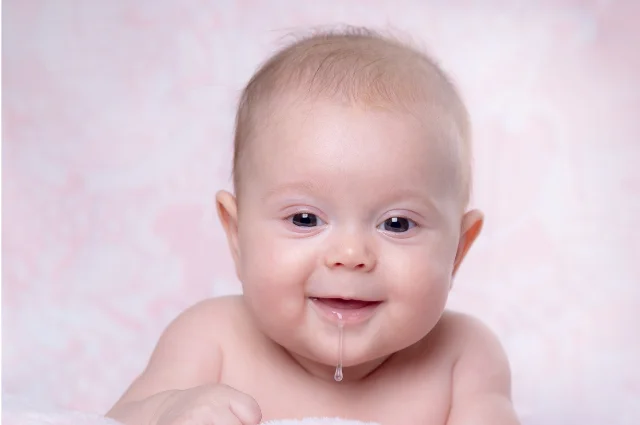Drooling is a usual behavior among children that starts at a certain age. In many children, it becomes more apparent from 3 to 6 months of age and may last many months. In rare cases, drooling can be a sign of a nose, ear, or throat medical disorder. It can also be a sign of teething among children. Is it normal for a baby to start drooling at 1 month? Yes, it is perfectly normal. Drooling is not a severe problem and should not be a cause for concern compared to drooling in adults. Your baby drooling at 1 month is a phenomenon that is common among children.
Hey! By the way… any links on this page that lead to products on Amazon are affiliate links and I earn a commission if you make a purchase. Thanks in advance – I really appreciate it! .
Why do 1 month old babies drool?
Drooling can be caused by the excess production of saliva by the salivary glands. Saliva softens and moisturizes the food your baby eats to enable easy swallowing. It protects the teeth and gums and makes the mouth moist. Despite these roles it plays in your baby’s life, some factors can cause your baby to drool:
1. Diet and development
Certain diets high in acidity can heighten saliva production. Drooling can also result from your baby’s muscle development and a growing sense of smell. When their motor receptor begins to develop, and they start to show signs of chewing their fingers, this may signal the brain through the salivary gland to produce more saliva, which is helpful in food digestion.
2. Age
Drooling also indicates that your baby’s salivary glands are yet to develop fully. So their mouths tend to produce more than enough saliva that it can contain. That is more prominent in a 1-month-old baby. As the months go by, the situation gets better.
3. Allergies
Your baby may drool so much if they react to something that enters their mouth.
How to reduce or stop baby drooling
- You can offer your baby drooling at 1 month plenty of fluids throughout the day. Small sips of water will help to keep your baby hydrated throughout the day. That will help to reduce drooling.
- Keeping your baby’s mouth clean can also help to reduce drooling. Ensure you regularly wipe their mouth and chin to keep them clean and dry.
- Giving your baby something to chew on will help to reduce drooling. Offer your baby a teething toy or a cold washcloth to chew on. Ensure these items are clean before putting them in your baby’s mouth.
- Offering your baby a pacifier to suck on will also help to reduce drooling. You must, however, ensure that the pacifier is always clean to avoid introducing germs into your baby’s mouth.
- Try to massage your baby’s gums regularly. Gently massage their gums with your finger, which can help reduce drooling. Ensure to do this only when your hands are clean.
- You can also change your baby’s position. Try to keep your baby in an upright position as much as possible. That will help to reduce drooling.
- Use a bib to catch any drool that your baby produces. That will help to keep their clothes dry.
Conclusion
Your baby drooling at 1 month is no case to worry about. As your baby develops, it may show this sign as one of the growth processes. Drooling in later months may indicate that your little one is about to grow some teeth. Try the tips discussed above to help to manage the situation whenever your baby starts to drool.


